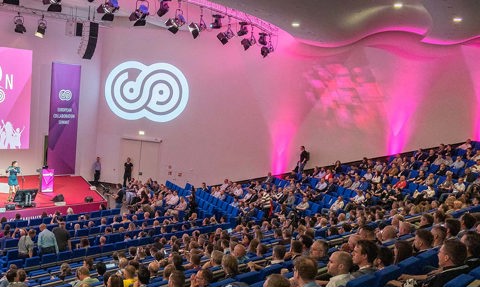The latest trends leading the change in the events industry


The event industry is witnessing a paradigm shift, with the latest trends emphasizing wellness, sustainability, and technological innovation.
The concept of 'softer productivity' transforms the event experience into one that nurtures attendees' physical and mental well-being. It's about creating an environment where participants can thrive, striking a healthy balance between productivity and personal growth. It seems that none of the event industry stakeholders wants to be pushed to their limits anymore. Event organizers can sense that the space nowadays is reserved for softer productivity that still allows them to deliver. To boil it down, people don’t want to return from a business trip feeling more tired than when they set off.
Recent reports state that the focus is on nurturing the overall wellness of event participants. “Work hard, play hard” gives way to “softer productivity,” a healthier balance of life and productivity. Increasingly, attendees don’t look forward to long days filled with presentations, followed by hitting the hotel bar. According to Berenberg Research, Gen Z drinks 20% less alcohol than Millennials, who drink less than Baby Boomers and Gen X. This also tracks those foregoing meat. According to Statista, of the UK adults who plan to not eat meat in 2023, 43% were Gen Z, 26% were Millennials, and 18% were from the previous generations combined.
Wellness is increasingly integrated into event agendas. Incorporation of elements of wellness into events is not just desirable but essential. The collapse of the virtual events industry post-pandemic has also reinforced the value of in-person interactions, with a clear preference emerging for face-to-face meetings over remote connections as one of the latest trends leading the change in the event industry.
Artificial Intelligence (AI) revolutionizes event planning by automating tasks, analyzing data, and enhancing attendee experiences. AI-powered chatbots, for instance, provide instant, personalized assistance, reflecting a broader trend of leveraging technology to streamline event management and boost engagement.
AI technology is already a powerful resource for planners in many areas, including venue sourcing, event marketing, and reviewing contracts. One of the key advantages of using AI in event planning is its ability to automate repetitive tasks. Traditionally, event planners spent countless hours manually sending invitations, managing RSVPs, and coordinating logistics. However, with AI-powered tools, these tasks can be streamlined and completed in a fraction of the time. AI can automatically send personalized invitations, track responses, and even suggest suitable venues based on attendee preferences.
Event planners are reimagining event spaces to foster interpersonal connections, using design strategically to spark dialogue and networking opportunities. These changes are not just about aesthetics but are rooted in a deeper understanding of how space influences interaction and learning.
Gone are the days of slogging through lengthy sessions, resulting in glassy-eyed audiences and information slipping through the cracks. Event planners see the benefit of leveraging reimagined interiors that drive interpersonal connections and curated activations. Now radically designed physical event environments intended to use metaphor to explore different topics. These intentional design elements offer an effective method of sparking conversations and creating networking opportunities.
Implementing sustainable practices can result in a 20–30% reduction in costs and a 60–80% reduction in waste (Events Industry Council). With attendees increasingly looking for eco-friendly experiences, demonstrating your organization’s commitment to these initiatives can help increase attendance and improve your reputation.
When it comes to creating sustainable events within your enterprise, there are a few key areas to focus on:
By making conscious, informed decisions, you’ll create events that have minimal negative effects on our planet and community. Plus, attendees will appreciate your enterprise's efforts to keep event sustainability in mind.
In summary, the latest trends leading the change in the event industry cater to a new generation's values, emphasizing well-being, sustainability, and technological innovation. Event organizers who embrace these trends can create memorable, impactful, and responsible events that resonate with modern attendees, ensuring engagement and longevity in the evolving landscape of the event industry.